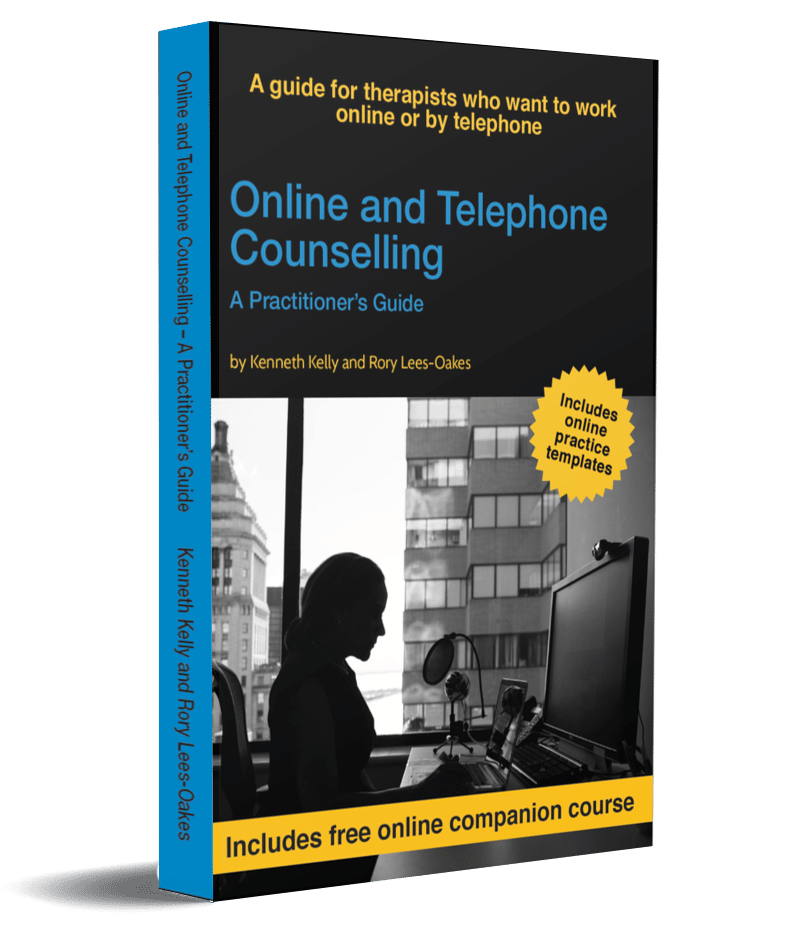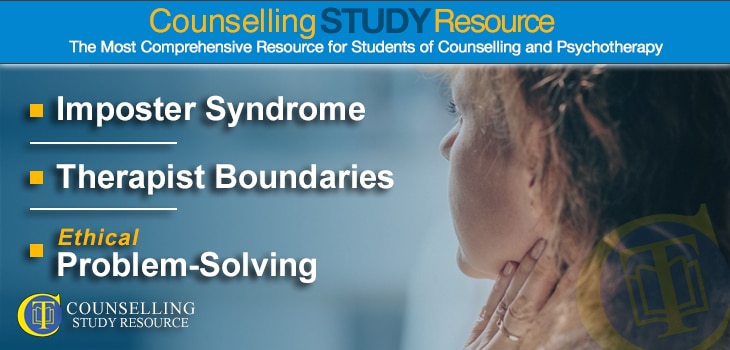167 – Therapist Boundaries
Imposter Syndrome – Ethical Problem-Solving
In episode 167 of the Counselling Tutor Podcast, Ken Kelly and Rory Lees-Oakes discuss imposter syndrome, before ‘The Digital Counselling Revolution’ looks at therapist boundaries when working online. Finally, in ‘Practice Matters’, the presenters talk about ethical problem-solving.
Imposter Syndrome (starts at 1.55 mins)
Imposter syndrome – describing the situation where someone doubts their own abilities and feels worried about being exposed as an imposter – is really common, even among people with lots of qualifications and experience.
While it tends to be a very lonely feeling, and you might feel that everyone else is going about their life and work confidently, imposter syndrome is a really wide experience among humans.
It’s important to remember that imposter syndrome bears no relation to real ability.
It is therefore important not to let your child ego have free rein on believing the feelings of incompetence, but instead to rationalise this and take responsibility for reminding yourself of your abilities.
It is of course natural to feel nervous about competence at times – for example, many student counsellors report this when they first start working with clients. In this case, the nerves likely relate to just how much you care.
That’s a good thing and the feelings are OK – it’s really only when the feelings of incompetence become a long-term, chronic issue, which can really sap your confidence and your desire to progress, that this becomes imposter syndrome.
Imposter syndrome is linked to Abraham Maslow’s idea of the Jonah complex, describing a fear of self-actualisation.
There is a lecture in the Counselling Study Resource (CSR) on imposter syndrome, and Rory has also created a handout on the Jonah complex. You can download the handout here, or access it through the CSR.
Therapist Boundaries (starts at 17.05 mins)

BESTSELLER
Online & Telephone Counselling Book
Available in Paperback and Kindle
Includes FREE COMPANION COURSE that you can do online to underpin and strengthen your learning
Boundaries are of course an important part of the therapeutic relationship for face-to-face counselling – and this is no less so for telephone and online work.
In fact, there are considerations relating to therapist boundaries that are particularly relevant when working in these ways, for example:
- your social media presence
- privacy of the client’s environment
- privacy of email accounts
- consistency of the counsellor’s environment
- counsellor availability by telephone.
The aim must be to outline your professional boundaries in advance (i.e. at contracting stage), to prevent them later being overstepped. In essence, clarity is essential.
A good starting point when setting therapist boundaries is to look at your professional body’s ethical framework; this can give you a good guide to areas to consider when contracting in order to ensure that professional boundaries are properly set at an early stage.
Most professional bodies require their members to undertake specific training in order to work online and/or by telephone. You might like to check out our course, Online and Telephone Counselling, which:
- has been awarded Quality Checked training recognition by the National Counselling Society (NCS)
- meets the British Association for Counselling and Psychotherapy (BACP) competence framework requirements for practitioners who wish to work with clients via telephone and e-counselling; the course exceeds 80 hours of guided learning, and the learning outcomes are mapped to the BACP competences for telephone and e-counselling.
Counselling Tutor is a recognised Association for Counselling & Therapy Online (ACTO) Online Training Provider, and this course enables the graduate to join ACTO.
The course equips practitioners with the skills, knowledge and abilities to work online and to offer services as an online and telephone counsellor, providing that the practitioner already holds a formal recognised counselling qualification.
You can read over 1,000 reviews of the course on our website too.
Ethical Problem-Solving (starts at 31.15 mins)
All therapists – both students and qualified practitioners – will naturally at times encounter ethical dilemmas.
As the BACP states in its Ethical Framework for the Counselling Professions (2018: 11):
‘The challenge of working ethically means that practitioners will inevitably encounter situations that require responses to unexpected issues, resolution of dilemmas, and solutions to problems.’
There is not necessarily one right answer to a dilemma – there may well be several ways to approach it ethically.
What is important is to follow a structured process in deciding what to do, and to document this (in the client’s notes if relevant) so that you have an audit trail in case your process is ever questioned.
Rory and Ken direct listeners to:
- Professor Tim Bond’s ethical problem-solving matrix, discussed in April 2016 in episode 12 of the Counselling Tutor Podcast
- Responding to ethical dilemmas, a blog post by the National Counselling Society.
Free Handout Download
Jonah Complex (or the Reason We Fear Success)
